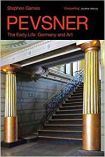Pevsner: The Early Life: Germany and Art by Stephen Games
| Pevsner: The Early Life: Germany and Art by Stephen Games | |
|
| |
| Category: Biography | |
| Reviewer: John Van der Kiste | |
| Summary: The first volume of a biography of the German-born academic, telling the story up to his move to England at the age of 31. | |
| Buy? Maybe | Borrow? Yes |
| Pages: 256 | Date: October 2011 |
| Publisher: Continuum | |
| External links: Author's website | |
| ISBN: 978-1441190932 | |
|
| |
Nikolai Pewsner – the minor changes of name came as a young adult - was born in Saxony in 1902 into a Russian-Jewish family. Just too young to avoid having to take part in the war, he had studied art history at no less than four universities by the age of 22. He then became an assistant keeper at the Dresden Gemaldegalerie, and four years later he was appointed lecturer at Gottingen University.
Educated with strong ideas on the importance of 'national character' in art and the general superiority of a resurgent Germany, smarting after its humiliation at the end of the First World War, despite his Jewish origins he felt perfectly secure for a while in his Lutheranism and commitment to German culture under the National Socialist regime. Like many others at home and throughout Europe, he initially saw Hitler as a stabilizing force and valuable reformer after the chaos and hyper-inflation that unsettled the nation during the 1920s.
Pevsner was a serious-minded man with a passion for scholarship. Naturally this book reflects the character of the man, and it is therefore a somewhat dry read. It is also devoid of illustrations, and even the cover has a photograph of the entrance lobby to his parents' apartment house, instead of a picture of the man himself. Although he married early in life and soon had a family, he appears to have been a rather distant husband and father. His daughter Uta later remarked that while 'he took an interest in us', he would leave home to go on his own to Italy, or some other European country, for months at a time, without a second thought. He was largely indifferent to English art as he believed it had contributed nothing to the main currents in Western civilization. In his gallery at Dresden, out of nearly 2,600 paintings, only five were English – and one of them had inadvertently been placed with the small American collection. Even contemporary English painters, with one or two exceptions, seemed to him an uninspiring conservative bunch. Nevertheless, they were worthy of study as there was the possibility that 'they could be used to delineate England's national character'.
Games has little to say on Pevsner's general family background beyond the basic facts, beyond the tragic matter of his unstable elder brother Heinrich getting into bad company and drowning himself as a young man, followed by their mother's attempted suicide. Not surprisingly, the artistic background is the main thrust of the book. He has plenty on Dresden, for example, the town which had long been the centre of most progressive art movements in Germany, culminating in an international exhibition in 1926, in which Pevsner played a major role.
While the Nazi political regime did not seem so threatening in its early years, by 1930 the shape of things to come was increasingly ominous. Posters with slogans like 'The Jews are in league with the Devil' appeared in public, and on houses where Jews were known to live. Friends of the Pevsners had the Manchester Guardian sent to them every day, but eventually the delivery became erratic – if it came at all – and when they did receive it, the pages were heavily censored in black ink. At length he realized that his position and that of his family at home was untenable, so he took a crash course in learning to speak English fluently, something which surprisingly he had not done at school, and reluctantly made the decision to leave his country and settle in Britain. From a German perspective, he noted, 'England looked like an academic wasteland' with a misguided sense of its own importance, and terrible food. Despite these disadvantages, it became the wisest move he ever made, and at length he established himself as a leading figure in artistic and architectural scholarship in his adopted country, although this stage of his career is beyond the scope of this book.
This is a scholarly read rather than a light one. Yet because of his pre-eminent position as an art historian in his adopted country, for anybody interested in the subject this will be a rewarding book, and the subsequent volume (or volumes?) will certainly be eagerly awaited.
Our thanks to Continuum for providing Bookbag with a review copy.
For another book on Germany in the modern age, may we recommend Springtime for Germany by Ben Donald.
Please share on: ![]() Facebook,
Facebook, ![]() Twitter and
Twitter and
![]() Instagram
Instagram
![]() You can read more book reviews or buy Pevsner: The Early Life: Germany and Art by Stephen Games at Amazon.co.uk Amazon currently charges £2.99 for standard delivery for orders under £20, over which delivery is free.
You can read more book reviews or buy Pevsner: The Early Life: Germany and Art by Stephen Games at Amazon.co.uk Amazon currently charges £2.99 for standard delivery for orders under £20, over which delivery is free.
![]() You can read more book reviews or buy Pevsner: The Early Life: Germany and Art by Stephen Games at Amazon.com.
You can read more book reviews or buy Pevsner: The Early Life: Germany and Art by Stephen Games at Amazon.com.
Comments
Like to comment on this review?
Just send us an email and we'll put the best up on the site.


